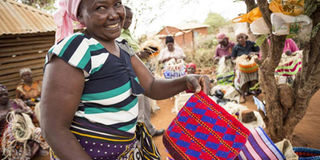Little group from Emali making a big difference in lives of local community members

Maka Emali's group members showcase some of the artistic items they make at their establishment in Emali. The group seeks to improve the livelihoods of locals by helping them boost their incomes through sale of their products. PHOTO | COURTESY
What you need to know:
- Maka Emali, whose name is made up of the first two letters of the two communities, has members drawn from the communities and was established in 2014.
- The Kamba community are prolific carvers and weavers while the Maasai are renowned for beadwork and making jewellery, decorations and ornaments.
- The members have also been taught wide-ranging computer skills and record-keeping.
- Maka Emali has given its members, from the two communities dominant in Emali, an opportunity to work together and draw on their rich traditional techniques.
A little-known local enterprise in Emali town, Makueni County, is etching its mark on the global art and craft-making scene.
The group, Maka Emali Group, exports its locally made pieces to international markets, hence improving its members’ lives while fostering peaceful coexistence between the Maasai and Kambas communities, who dominate the little township of Emali.
Maka Emali, whose name is made up of the first two letters of the two communities, has members drawn from the communities and was established in 2014.
Its intention is to help the members cope with effects of the dry and arid conditions in the area, where other economic activities are increasingly hard to find.
“Since it has been difficult to cultivate crops in the area due to very little rainfall, and cattle keeping is similarly becoming untenable due to drought, we sought to give the community an alternative way of earning a living and improving their livelihoods,” says Ancelim Gituma, the region’s programmes’ manager of Child Fund, the organisation that sponsors the group.
The joint project, themed ‘building resilience for two drought affected communities in Kenya,’ has a craft component that is helping locals turn their indigenous artistry in carving, weaving and jewellery-making into production of high-end
The Kamba community are prolific carvers and weavers while the Maasai are renowned for beadwork and making jewellery, decorations and ornaments.
This combination has proved a perfect blend for an enterprise whose premise is making baskets, bags, sculptures, decorative walking sticks, bags, jewellery, traditional footwear, decorative garments and apparels, and carvings, among others.
The enterprise seeks to ensure the artisans earn a decent sum from an activity they previously only did for fun and as a pastime, according to Mr Gituma.
“These locals, who initially did their carving, weaving and jewellery-making for leisure, can now earn decent livelihoods through their own handiwork,” he says. Through Child Fund-New Zealand, the group has been trained on proper finishing of their products and effective marketing.

Group members at work inside their workshop in Emali Town. They specialise in making baskets, sculptures, jewellery, walking sticks and bags among other items. PHOTO | BRIAN OKINDA | NMG
The members have also been taught wide-ranging computer skills and record-keeping.
Maka Emali has since been making products and marketing them through an online platform and various social media sites.
HELPING CHILDREN ACCESS BASIC NEEDS AND EDUCATION
Iko Iko, a world renowned curio and gifts shop in New Zealand with outlets in Auckland and Wellington, is the group’s products largest distributer.
Others include curio outlets in South Korea, Indonesia, Australia, China, the Kenya National Museum, Serena Hotels especially at the neighbouring Amboseli Serena Lodge, Miriam’s, a home-grown celebrated establishment based in Emali, Crafts Caravan shops, and Vikings in Nairobi, among others.
“Our products range in price from Sh200 to Sh15,000 depending on what one purchases, its special features and details and its uniqueness,” says Peter Aburi, who is in charge of marketing and advisory in the group.
He however notes that at one time, one of their pieces, a wooden mask, was sold for Sh60,000 in New Zealand.
Ms Anne Ramaita, Maka Emali’s president, notes that since their inception three years ago, the group, whose members ages range between 35 and 70, has made profits of more than Sh3 million.
“This enterprise has a cultural preservation angle to it, too, as through it, some of the skills that were slowly eroding can now be passed on to the younger generation. It is, however, disheartening that not many young people are taking a keen interest in such profitable activities,” she says.

Inside their curio in Emali, the group displays items they make. Their luxury items are sold at premium prices worldwide, under the brand Maka Emali. PHOTO | BRIAN OKINDA | NMG
The group’s star artisan, for instance, is Ms Mwelu Wambua, who, at more than 70, makes perhaps the best and most recognisable pieces on the global markets, according to Ms Ramaita.
She adds that Ms Mwelu’s woven baskets are almost water tight and the international clientele can tell them apart from those made by other artisans on the global markets, a notion that the other group members concur with.
Robert Kamula, Susan Lenankai and Paul Makau, all members of the group in their mid-40s, note that they are now able to fend for themselves and their families through the group.
“The best part of this arrangement is that in buying our products, the clientele is helping ensure a child somewhere in Emali gets access to basic needs and education through our association with Emali Dedicated Children’s Agency and Child Fund,” says Ms Ramaita.
Maka Emali has given its members, from the two communities dominant in Emali, an opportunity to work together and draw on their rich traditional techniques.





